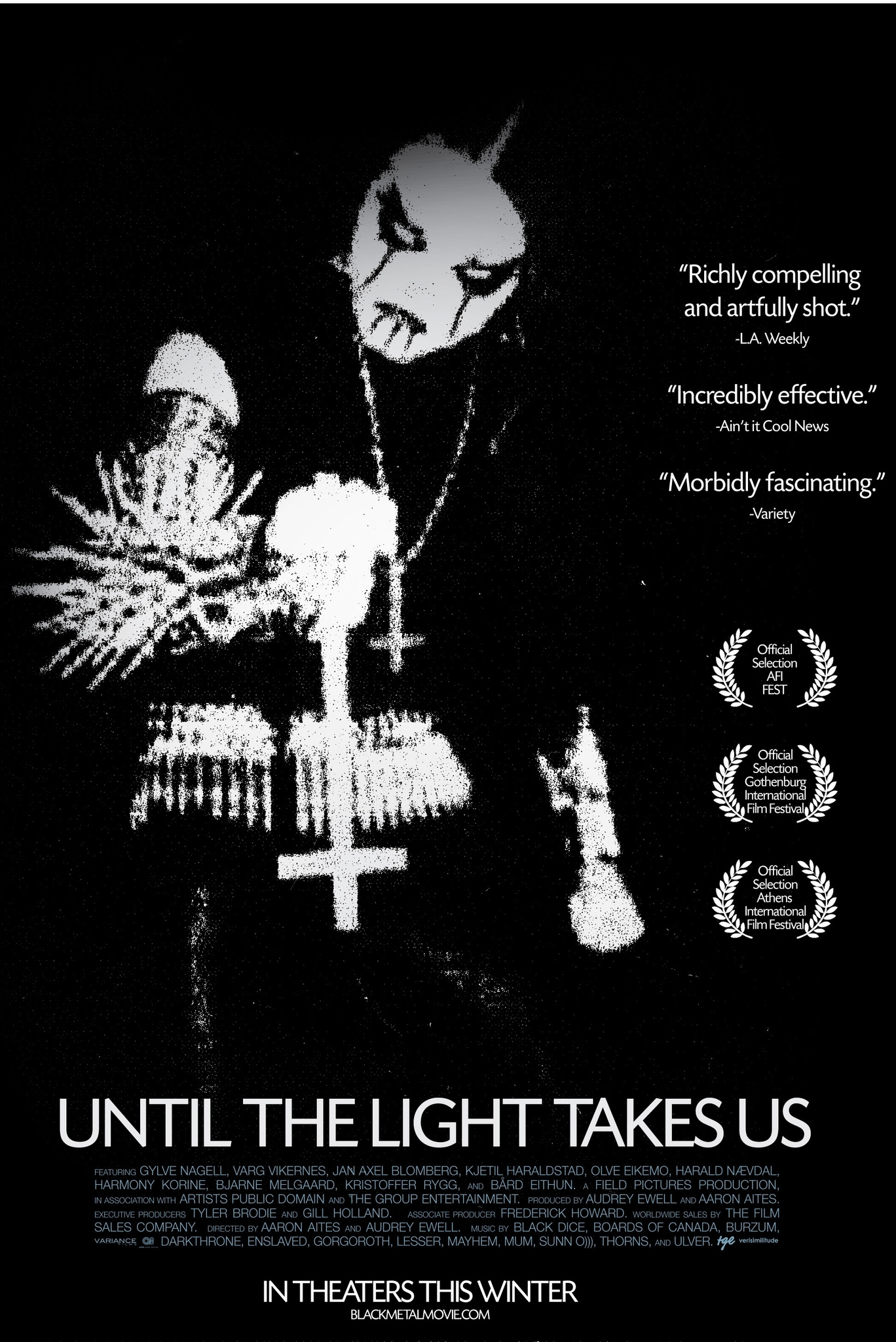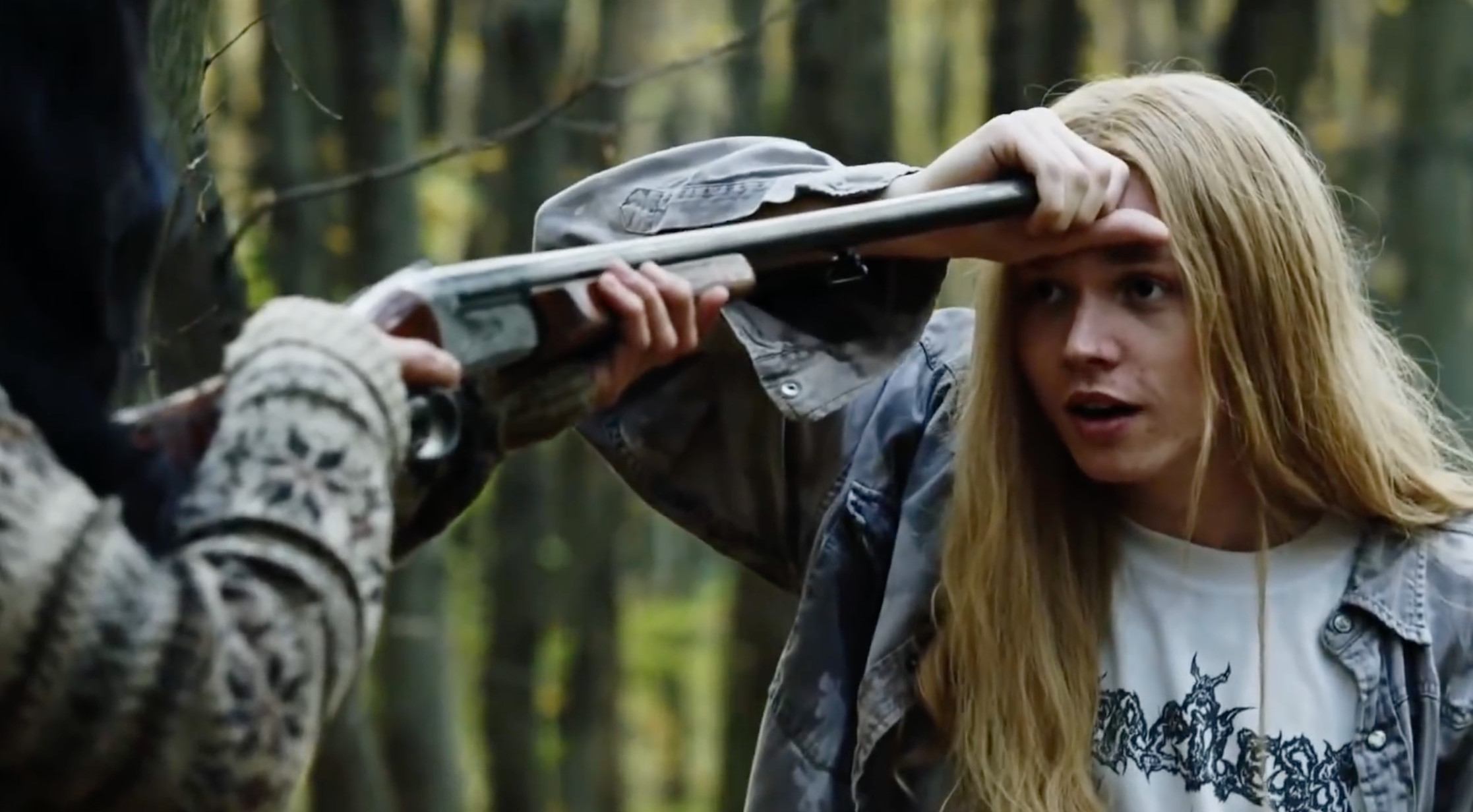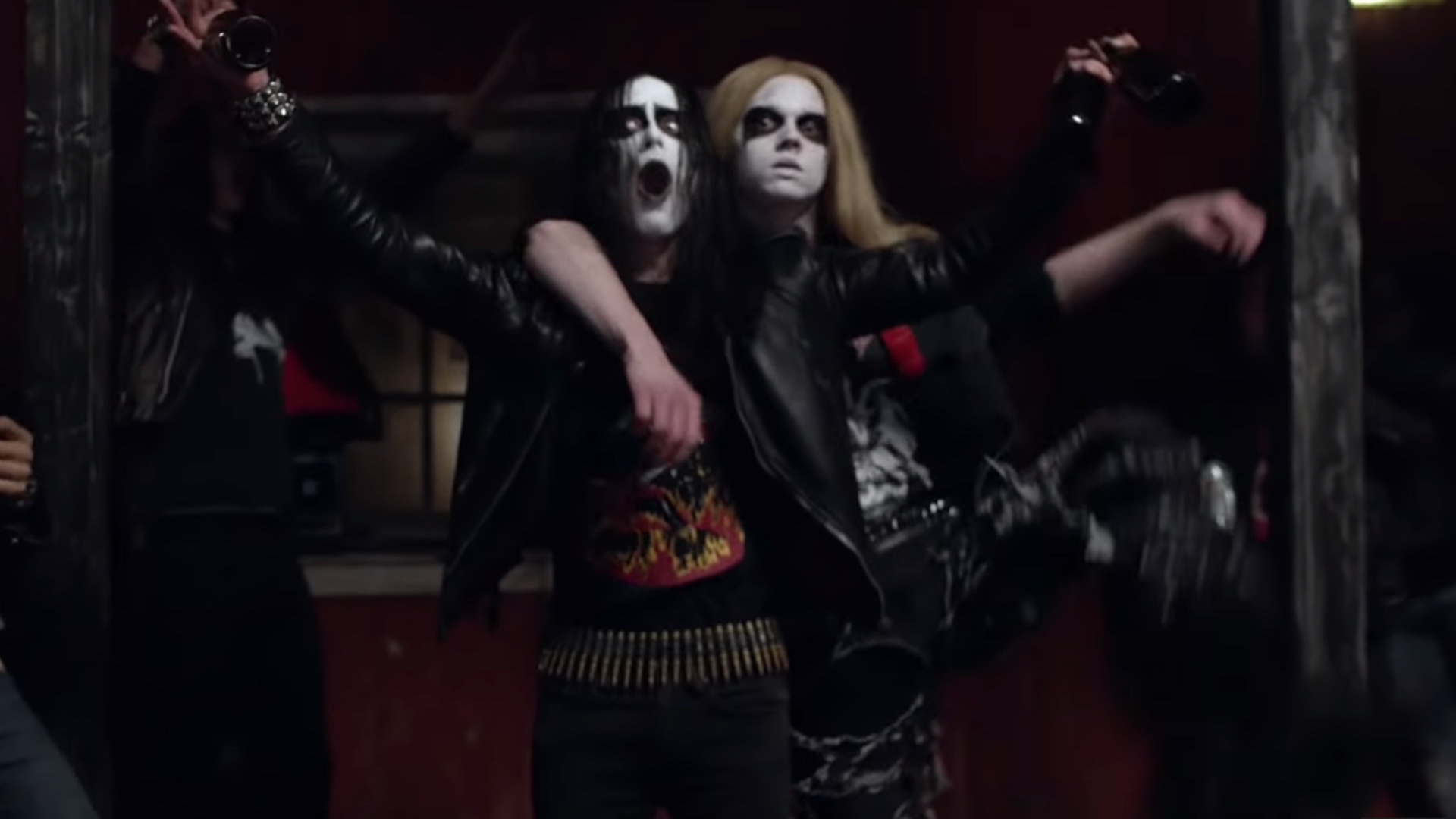Long before there were Hipsters,
there existed Norwegian Black Metal.
Originally published at Ghastly Grinning, February 24, 2019
Lords of Chaos opens with some text that perfectly sums up what you are about to watch. “This film is based on Truth… Lies… and what really happened.” Reading that really allowed me to divorce myself from trying to unravel truth and just enjoy the story. I had a big problem with this in Bohemian Rhapsody. You can’t deviate from the truth with such an iconic, popular figure. I found it to work much easier with a film about an obscure subculture that no one really knows much about.
Lords introduces us to Øystein Aarseth aka Euronymous - the guitarist and mastermind behind one of the first Norwegian Black Metal bands, Mayhem. Euronymous omnipotently tells us the story of his struggles with his extreme music subculture, his troublesome friendships, and ultimately his own death. I haven’t read the book that Lords is based on (yet), but I was familiar with the story because of the Until the Light Takes Us documentary that it came out years before.
Writer/Director Jonas Åkerlund takes true crime material (that he knew at an intimate level, being the drummer of Bathory) and with painstaking detail, crafts it into an excellent heavy metal black comedy/horror thriller. Particularly, the comedic elements that permeate the whole film from beginning to end are brilliant, making for scathing, effective satire. He masterfully distills a tone that can instantaneously jump from being deadly serious to being deadly ridiculous. To invoke Mick Garris’ elegant terminology (by way of Elric Kane on Shockwaves Podcast), the comedy is SO black, that it ends up being as red as all the blood spilled in this film.
Just like the human body needs electrolytes for hydration, so does Lords need this comedy to balance the incredibly grim and graphic violence running through its veins. This is not cartoonish slasher decadence. It is the dark, matter-of-fact reality that occurs when you stab someone with a knife or blow your own head off. The film doesn’t sugarcoat the situation, the camera doesn’t cut away, and it is BRUTAL. BRU-TAL. It is the authenticity of this violence along with a lack of score that pays a sort of respect to these very serious things that really happened to actual people. Despite its content, nothing feels overly sensationalized or exploited. But that is not the case with most True Crime, more on that later.
The story itself is framed by this juxtaposition of wholesome Norway and the true Norwegian Black Metal scene within. It is the very vital foundation needed for this sort of satirical commentary. Several times throughout the screening, I am reminded of the Goth kids from South Park who mirror the perfect symbolic reflection of the goofy tongue-in-cheek celebration of all things dark and evil.
Subcultures tend to be the revolutionary counter-culture reactions to some sort of socio-political turmoil. But with the Norwegian Black Metal scene, you have this really nice place where nothing bad ever happens. There is no crime, no oppression, everyone has healthcare, but 75% of the population is Christian. And so the disenfranchised youth ends up taking on this extreme reverse ideology as a form of rebellion and expression of individuality. They despise the message of love that Christianity encompasses as a whole. At one point, Euronymous proselytizes his desire to spread things like hatred, sorrow, and evil.
Within this music scene, there is an obsession over purity and authenticity. Universally, in the prison system, one of the worst things you can be is a snitch or a rapist. For any musical subculture, it is being a poser. It is a word that gets thrown around constantly in Lords. For these guys, the music and lifestyle are a “religious” means towards a path of the authentic nirvana that they so deeply crave. As actor Rory Culkin said, ‘They are the hipsters of the metal world.”
Encompassing this cultivated dark image requires full commitment. But it is not so easy when Mom and Dad subsidize your life style by investing in your epic Black Metal record shop, or give you potted plants to take back to your pad. There is a brief moment when Bård Guldvik "Faust" Eithun (who lives at home) is halfway out the door to murder a gay man before mom innocently calls out to him about his whereabouts. You have to try really hard to be evil, no matter how much Mom loves you.
The seemingly never ending elitist quest to be the most extreme also comes at the price of everyone trying to outdo one another or impress each other. Swirling in the epicenter is the adversarial friendship between Euronymous and Kristian aka Varg Vikernes. They both want the same thing: To be taken seriously. But they go about it in polarizing ways.
Varg initially craves acceptance from this peer group. His initial awkward attempt to enter their black circle is rebuked by the Scorpions patch on his jacket when Euronymous dismisses him with a contemptible glance. Eventually he is given a Indiana Jones like test in Euronymous’ shop where he is told that the real Metal is hidden and if he wants it, he must find it. His childlike naïveté leads him to think these guys are the real deal, and so he too must prove himself by committing arson.
Rory Culkin is truly a chameleon, losing himself in the role of Aarseth/Euronymous. Jonas deliciously casts Emory Cohen, a Jewish actor to play the very anti-Semitic Varg. Much like the people that portray them, Euronymous and Varg are both are actors desperately trying to fit into their Black Metal personas. While Euronymous can turn it on and off (especially when things get illegal), Varg cannot. Underneath it all, Euronymous is a lazy, opportunistic braggart who is more than happy to take credit for these crimes in order to further bolster his carefully crafted image. Despite his superficial foul mood, he is patient and polite when it comes to the proper spelling of his forthcoming album De Mysteriis Dom Sathanas to Kerrang magazine.
Varg seems bedeviled by a soft upbringing that is heavily implied, he is mocked for his “Kristian” name. One can’t help but think that this was a personal barb against the real life Varg who is an observer of Odinism/Paganism that despises anything Judeo-Christian. Varg’s arsonist motivations are fueled by his resentments towards the institutions of Christianity and how they erased the Pagan/Norse cultures that existed long before. His involvement in this movement is his twisted way of trying to connect with his Viking heritage. In hindsight, their entire scene feels like a backwards attempt to connect with this past as these modern day Vikings. Their strength, masculinity, and machismo are directly connected to their tolerance of generally unlistenable music.
In the documentary Until the Light Takes Us, the real Varg goes into great detail to justify his “moralistic” retaliation (a firefighter perished as he tried to put out one of the church fires). His calm demeanor, well-read intellect, and soothing voice make him very compelling at times. But then you remember he is a piece of shit Neo-Nazi sitting in prison for stabbing his friend to death…
The film portrays Varg in a vastly different sort of way. He is a stocky, nerdy, socially awkward man child. It is Varg’s stupidity and adolescent naïveté that make him dangerous, fuel his crimes, and get him caught.
Euronymous’ tragedy is that he is always running from his truth: That he is a poser like all the rest. When the crimes of the Black Circle reach a point of no return, he relents, ready to sort of walk away from it all. After finding intimacy with the photographer he is always trying to impress, he begins to take the steps he needs to embrace who he truly is and does the most UNMETAL thing one could do... He lets his girlfriend cut off his hair. I would love to make an analogy to Samson and Delilah here, but I don’t think it fits because Aarseth never had the strength that he perceives in his Euronymous persona. It was always just a fragile, decorative shell that was capable of cracking at any moment. And now, here he is like a soft gooey lobster waiting for a new shell to harden when Varg comes knocking. Although no one will ever know exactly how it went down, Jonas shows us a very sad, ironic, tragic, brutal ending for our narrator as he begs for his life and for Varg’s friendship.
For me personally, I have never enjoyed the True Crime genre and generally find it tasteless - I say this as a horror film fanatic and gore hound. I think on an ethical, respectful level, 9/10 times it is better left to documentaries. Why do we need to see a reenactment of the horrible things that happened to real people? What about their very real families and their feelings? What purpose does it ultimately serve? Why is Lords of Chaos an exception? Because it creates a very important social awareness in the examination of depression, suicide, and the real violence involved when murdering another human being.
We hear all the time about how people commit suicide, sometimes seemingly out of nowhere, especially with celebrities. Depression is this terrible, deadly affliction that the average person simply doesn’t understand. But the tragic portrayal of Per Yngve Ohlin’s (AKA Dead) suicide takes us behind the curtain. It sums up for us that sometimes there is no rhyme or reason why people do this to themselves. Their brains are not wired correctly and they put themselves in very permanent solutions for (what might be) a temporary state of mind.
Dead’s worship of death while alive, seemed to be the only way he was able to really to feel anything at all. For when he is not worshiping at the altar of death he is practically catatonic in a purgatory of boredom and dullness. This existence is so painful for him that he rather not be alive.
Even being aware of the infamous story beforehand, nothing could prepare me for the shock I felt as I watched Dead violently end his life. There was something so real and genuine to the horror of it, no documentary could convey it in the same way. When Aarseth finds his friend, he is confronted with the actual reality of the brutality he pretends to encompass as Euronymous and has no idea what to do. How should Euronymous act? Aarseth decides that his alter ego would take pictures of the corpse, eat Dead’s brains (he didn’t), and make pendants passed off as actual fragments of Dead’s skull (he admits later that they were chicken bones). In his pathetic quest for fame, he goes for the lowest hanging fruit.
In some ways, Lords makes for a great spiritual companion to the punk rock indie classic SLC punk. Both stories circle around two friends in religious/wholesome places, where the main character (who is also the voice over narrator) finds out that he was a poser all along and falls in love. While the real life Black Metal nerds and Varg groupies will lambast and skewer this film, I think Lords of Chaos is destined for immortal cult film status. It is a perfect document for its obscure subculture.






